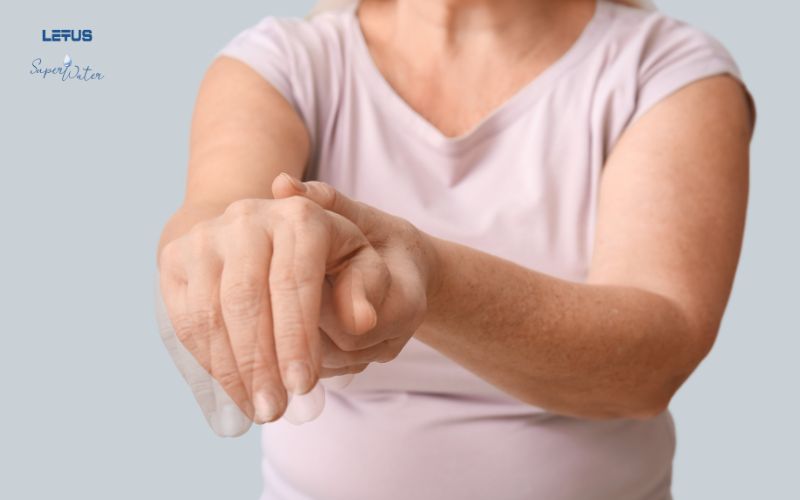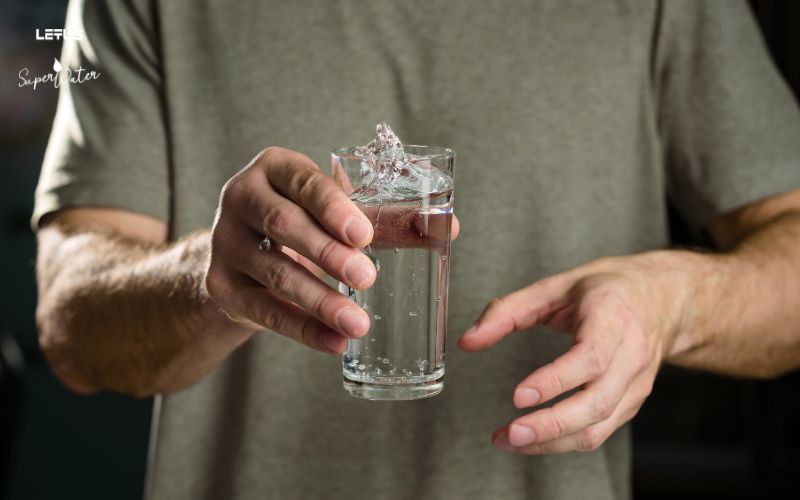Parkinson’s disease (PD) can lead to dangerous complications that affect a patient’s physical health, psychological well-being, and ability to perform daily activities. Management strategies for Parkinson’s disease are currently being researched and developed to enhance patients’ quality of life.
Join Letus SuperWater as we explore management strategies for Parkinson’s disease in the article below!

1. Dangerous Complications of Parkinson’s Disease
Failure to detect Parkinson’s disease and implement timely management strategies can lead to dangerous complications. Parkinson’s disease creates many difficulties and inconveniences in daily life, specifically:
Complications Affecting Daily Activities
- Tremor: This is the most characteristic symptom of Parkinson’s disease, often starting on one side of the body and later spreading to both. Tremors typically occur at rest and lessen during activity.
- Rigidity (Muscle Stiffness): Muscles become stiff and contracted, making joint movement difficult.
- Bradykinesia (Slowness of Movement): Movements become slow and difficult, such as standing up, sitting down, and walking.
- Impaired Balance: Patients are prone to losing balance and falling.
- Abnormal Gait: Steps are small and shuffling, with a rigid, dragging quality.
Complications Affecting Quality of Life
- Difficulty with Daily Activities: Eating, personal hygiene, and dressing become challenging.
- Reduced Work Capacity: The condition affects employment and reduces productivity.
- Social Isolation: Due to mobility limitations and other symptoms, patients can easily feel lonely and withdrawn.
- Psychological Changes: Depression and anxiety affect the overall quality of life.

Motor Complications
- High Risk of Falls: Due to impaired balance and an unstable gait, patients are susceptible to falls, which can cause injuries like fractures or head trauma.
- Dysphagia (Difficulty Swallowing): This can cause weight loss and increase the risk of aspiration pneumonia due to food entering the lungs.
- Sleep Disorders: Insomnia, non-restorative sleep, snoring, and other sleep disturbances.
- Postural Changes: Stooped posture (kyphosis), stiff neck, and abnormal gait.
Psychological Complications
- Depression: Due to the impact of the disease on life and mobility, patients are susceptible to depression and anxiety.
- Anxiety and Nervousness: Frequent feelings of unease and stress.
- Hallucinations and Delusions: These occur in some cases, particularly as a side effect of medication.
Management strategies for Parkinson’s disease always involve meticulous care and emotional support to help stabilize the patient’s mental state.
Cognitive Complications
- Memory Impairment: Difficulty remembering new information or recent events.
- Executive Dysfunction: Difficulty concentrating and making decisions.
- Disorientation: Difficulty navigating or recognizing the surrounding space.
Other Complications
- Urinary Incontinence: Due to pelvic floor muscle dysfunction.
- Constipation: Due to reduced physical activity and inadequate diet.
- Skin Ulcers (Pressure Sores): Caused by remaining in one position for long periods, especially in areas in contact with hard surfaces.
- Increased Risk of Other Diseases: Cardiovascular diseases, diabetes, and cancer.
2. Management Strategies for Parkinson’s Disease

Although there is no complete cure, management strategies for Parkinson’s disease can help mitigate dangerous complications and improve patients’ quality of life.
Management strategies for Parkinson’s disease include:
Medication Therapy
Drugs that replace dopamine, a neurotransmitter deficient in Parkinson’s patients, are used. Additionally, other medications can be prescribed to manage various symptoms of the disease.
Surgical Intervention
- Deep Brain Stimulation (DBS): This method uses electrodes implanted in the brain to regulate abnormal neural activity.
- Cell Transplantation: This is a new treatment method currently under research and development.
Physical Therapy and Rehabilitation
- Regular Exercise: Gentle exercises, yoga, and Tai Chi help improve flexibility, muscle strength, and motor coordination.
- Physical Therapy: A physical therapist provides guidance on specific exercises to improve problems with walking, balance, and daily activities.

Supportive Care
- Diet: A healthy diet rich in fiber and adequate water intake helps improve digestion and reduce constipation.
- Sufficient Sleep: Sleep plays a vital role in energy restoration and mood improvement.
- Stress Reduction: Relaxation techniques such as meditation, yoga, and listening to music can help reduce stress and anxiety.
- Social Interaction: Participating in social activities and meeting friends and family helps improve mood and quality of life.
Drinking Hydrogen-Rich Water
This is one of the effective strategies for managing Parkinson’s disease and is beneficial for the patient’s liver and kidneys. Drinking high-concentration Hydrogen water may help alleviate Parkinson’s disease symptoms, depending on the individual’s condition.
This has been researched and applied globally, with its use now spreading in Vietnam.
Oxidative stress is linked to the progression of Parkinson’s disease (PD). Recent studies have confirmed that molecular Hydrogen acts as a highly effective antioxidant in cultured cells. Drinking water dissolved with Hydrogen reduces oxidative stress and improves Parkinson’s disease.
“Hydrogen-rich saline improves memory function in a rat model of amyloid-beta-induced Alzheimer’s disease by reduction of oxidative stress” by By Dr. Asako Yoritaka, Dr. Masashi Takanashi, Dr. Masaaki Hirayama, Dr. Toshiki Nakahara, Dr. Shigeo Ohta, Dr. Nobutaka Hattori, 2013
3. Letus SuperWater: A Supportive Solution for Managing Parkinson’s Disease

Letus SuperWater is one of the management strategies for Parkinson’s disease due to its high Hydrogen concentration:
- Hydrogen eliminates harmful free radicals, especially the hydroxyl radical, around nerve cells by combining with this free radical to form water. This process helps protect nerve cells and prevents damage.
- Hydrogen also permeates damaged nerve cells to promote healing and restore the cells to their optimal state, helping them function more efficiently.
- Hydrogen also possesses anti-inflammatory properties and helps protect and regenerate the cell membrane and nerve endings, keeping nerve cells healthy. Healthy nerve cells can produce more Dopamine, which stabilizes neurotransmission, improves Parkinson’s symptoms, helps reduce hand tremors, enhances memory, and promotes more flexible movement every day.

Letus SuperWater is high-concentration Hydrogen water and an antioxidant that can regenerate and help prevent aging nerve cells and neutralize harmful free radicals to nerve cells. Letus SuperWater may help improve the symptoms of Parkinson’s disease, including:
- Reducing hand tremors and enabling independent daily activities.
- Improving mobility, such as being able to cook daily.
- Enhancing balance and stable walking.
- Reducing muscle stiffness and allowing for slow, deliberate turning and talking.
- Reducing the risk of complications by preventing the disease from progressing to a more severe stage.
The recovery potential of a Parkinson’s patient depends on the severity and state of the illness.
However, early detection and timely use of Parkinson’s management strategies, such as medication or drinking Letus SuperWater, offer numerous benefits:
- Effective Symptom Control: Modern medications and treatment methods can significantly reduce symptoms like tremor, rigidity, and bradykinesia, helping patients maintain a normal life.
- Slowing Disease Progression: Early treatment can help prolong the time patients remain in the mild stage, avoiding dangerous complications later on.
- Enhancing Quality of Life: By controlling symptoms and slowing disease progression, patients can maintain daily activities, social engagement, and enjoy life.

Furthermore, Parkinson’s patients should pay attention to the following:
- Learn About the Disease: The more you understand the disease, the more proactive you can be in treatment and self-care.
- Maintain a Healthy Diet: Eat plenty of green vegetables and fruits, and limit foods high in oil and sugar.
- Exercise Regularly: Gentle exercises like walking, yoga, and Tai Chi help improve health and reduce disease symptoms.
- Get Enough Rest: Ensure adequate sleep for the body to recover.
- Engage in Social Activities: Interacting with loved ones and friends helps reduce stress and improve mental well-being.
- Use Assistive Devices: Canes, walkers, wheelchairs, and grab bars help patients move around more easily.
Focus on managing the condition daily to reduce the dangerous complications of Parkinson’s disease and improve your quality of life every day!
Always pay attention to the health of your loved ones and seek treatment immediately if you notice signs of Parkinson’s disease. Try Letus SuperWater Hydrogen water now—one of the strategies for managing Parkinson’s disease—to reduce symptoms and prevent the disease from progressing!



